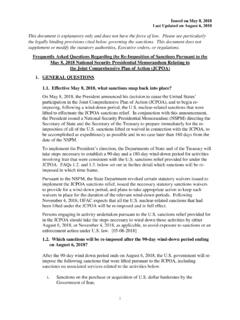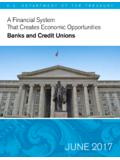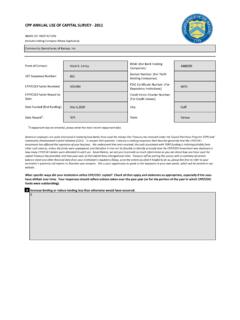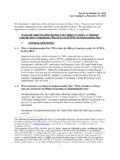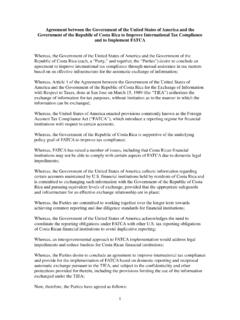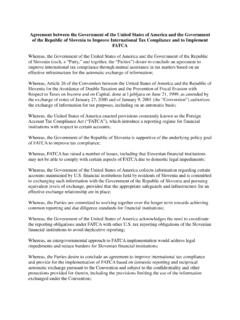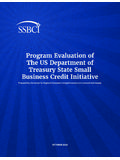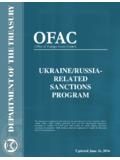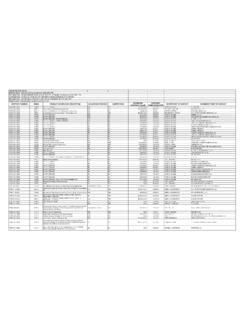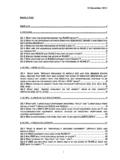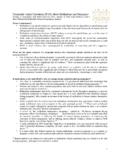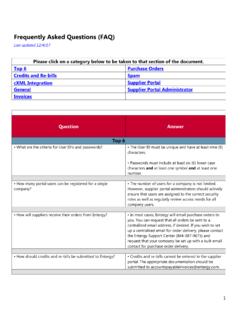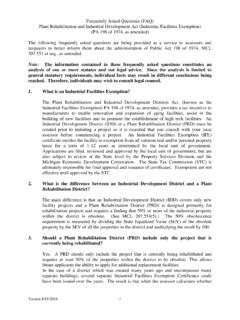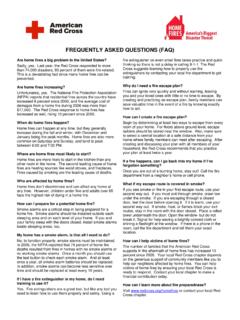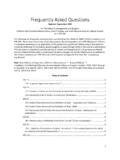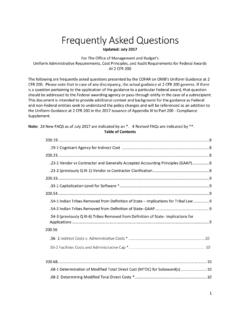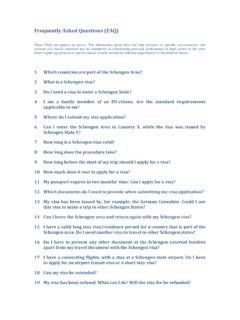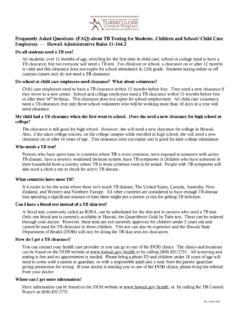Transcription of UPDATED NOVEMBER 8, 2017 - Front page
1 UPDATED NOVEMBER 8, 2017 1 department OF THE treasury OFFICE OF FOREIGN ASSETS CONTROL frequently asked QUESTIONS RELATED TO CUBA This document is explanatory only, does not have the force of law, and does not supplement or modify the Executive Orders, statutes, or regulations relating to Cuba. Where specific questions arise about applicability, scope, impact, or any other aspects of these sanctions, it is the responsibility of individuals or entities seeking guidance to review the relevant statutes, regulations, and Executive Orders, and, if appropriate, consult with legal counsel. I. Embargo II. Travel III. Travel and Carrier Services IV. Remittances V. Banking VI. Trade/Business VII. Telecommunications VIII. Third-Country Effects IX. Miscellaneous I. Embargo 1. Where can I find the most recent amendments to the Cuban Assets Control Regulations (CACR)? See the Federal Register. 2. When are the most recent amendments to the CACR effective? The most recent amendments will become effective when published in the Federal Register on NOVEMBER 9, 2017.
2 3. Are sanctions on Cuba still in place following the June 16, issuance of the National Security Presidential Memorandum (NSPM) on Strengthening the Policy of the United States Toward Cuba? Yes, the Cuba embargo remains in place. Most transactions between the United States, or persons subject to jurisdiction, and Cuba continue to be prohibited, and OFAC continues to enforce the prohibitions of the CACR. OFAC is issuing regulatory amendments to implement the changes to the Cuba sanctions program outlined in the NSPM. Specifically, OFAC is issuing changes to: restrict persons subject to jurisdiction from engaging in direct financial transactions with entities and subentities identified on the State department s List of Restricted Entities and Subentities Associated with Cuba ( Cuba Restricted List ), with certain exceptions; add requirements to certain categories of educational travel; remove the authorization for individual people-to-people educational travel; add requirements to the travel authorization Support for the Cuban People; and amend the definition of Prohibited officials of the Government of Cuba.
3 UPDATED NOVEMBER 8, 2017 2 4. Is the department of Commerce also amending its regulations? Yes. The department of Commerce s Bureau of Industry and Security (BIS), in coordination with OFAC, is also amending its Export Administration Regulations (EAR) (15 CFR Parts 730-774) to implement the NSPM on NOVEMBER 9, 2017. The BIS rule amends the licensing policy for Cuba and portions of three license exceptions available for exports and reexports to Cuba. For additional information, see BIS s Cuba webpage. II. Travel For questions regarding travel and accompanied baggage between the United States and Cuba, see the specific guidance on OFAC s webpage. 5. What are the travel authorizations in the Cuba program? OFAC has issued general licenses within the 12 categories of authorized travel for many travel-related transactions to, from, or within Cuba that previously required a specific license ( , an application and a case-by-case determination). Travel-related transactions are permitted by general license for certain travel related to the following activities, subject to the criteria and conditions in each general license: family visits; official business of the government, foreign governments, and certain intergovernmental organizations; journalistic activity; professional research and professional meetings; educational activities; religious activities; public performances, clinics, workshops, athletic and other competitions, and exhibitions; support for the Cuban people; humanitarian projects; activities of private foundations or research or educational institutes; exportation, importation, or transmission of information or information materials; and certain authorized export transactions.
4 In accordance with the NSPM, OFAC is adding a new prohibition to restrict certain direct financial transactions with entities and subentities identified on the State department s Cuba Restricted List. For a description of the scope of the prohibition on direct financial transactions and the restrictions and exceptions that apply, see 31 CFR In order to implement this prohibition, OFAC is making a conforming change to and is adding corresponding language in the following general licenses: , , , , , , , , , , , , , , , , , and OFAC has not incorporated this prohibition into certain general licenses in accordance with the exceptions detailed in section 3(a)(iii) of the NSPM. 6. Are authorized travelers who have initiated travel arrangements prior to the addition of an entity or subentity on the State department s Cuba Restricted List required to cancel their Cuba-related travel plans if their travel arrangements involve direct financial transactions with a listed entity or subentity?
5 Consistent with the Administration s interest in avoiding negative impacts on Americans for arranging lawful travel to Cuba, any travel-related arrangements that include direct financial transactions with entities and subentities that appear on the State department s Cuba Restricted List will continue to be permitted, provided that those travel arrangements were initiated prior to the State department s addition of the entity or subentity to the list. Once the State department adds an entity or subentity to the Cuba Restricted List, new direct financial transactions with the entity or subentity will not be permitted, unless authorized by OFAC or exempt. For a complete UPDATED NOVEMBER 8, 2017 3 description of the scope of the prohibition on direct financial transactions and the restrictions and exceptions that apply, see 31 CFR 7. Do travelers who fall within the scope of a general license need to submit a written request to OFAC for permission to travel or conduct transactions?
6 No. No further permission from OFAC is required to engage in transactions by a person who meets all criteria in a general license. Individuals wishing to engage in activities that may fall within the scope of a general license should review the relevant general licenses contained in the CACR to determine whether their travel-related transactions are covered by such general licenses. Persons subject to jurisdiction who wish to engage in any travel within the 12 categories of activities specified in the CACR that does not meet the requirements of a general license will need to apply for a specific license from OFAC. 8. Is travel to Cuba for tourist activities permitted? No. Consistent with the Trade Sanctions Reform and Export Enhancement Act of 2000 (TSRA), travel-related transactions involving Cuba are only permitted for the 12 categories of activities identified in the CACR. Travel-related transactions for other purposes remain prohibited. 9. What constitutes a close relative for generally authorized family travel?
7 OFAC regulations generally authorize persons subject to jurisdiction and those sharing a dwelling with them as a family to visit a close relative in Cuba, including a close relative who is a Cuban national or a person ordinarily resident in Cuba, or to visit or accompany a close relative who is located in or traveling to Cuba pursuant to the authorizations in (official government business), (journalistic activity), (a) (professional research), (a)(1)(i) through (iv) and (vi) (educational activities), (religious activities), (humanitarian projects), or (activities of private foundations or research or educational institutes). A close relative is defined as any individual related to a person by blood, marriage, or adoption who is no more than three generations removed from that person or from a common ancestor with that person. For a complete description of what this general license authorizes and the restrictions that apply, see 31 CFR and In accordance with the NSPM, OFAC is amending this general license to exclude from the authorizations direct financial transactions with entities and subentities identified on the State department s Cuba Restricted List.
8 For a description of the scope of the prohibition on direct financial transactions and the restrictions and exceptions that apply, see 31 CFR 10. Who is generally authorized to engage in travel and travel-related transactions for journalistic activity ? OFAC has issued an expanded general license that incorporates prior specific licensing policy and authorizes, subject to conditions, travel-related transactions and other transactions that are directly incident to journalistic activities in Cuba. Among other things, this general license authorizes, subject to conditions, full-time journalists, supporting broadcast or technical personnel, and freelance journalists to travel to Cuba. The traveler s schedule of activities must not include free time or recreation in excess of that consistent with a full-time schedule. An entire group does not qualify for the general license merely because some members of the group qualify individually. For a complete description of what this general license authorizes and the restrictions that apply, see 31 CFR UPDATED NOVEMBER 8, 2017 4 11.
9 What constitutes generally authorized travel-related transactions for professional research and professional meetings in Cuba? OFAC has issued an expanded general license that incorporates prior specific licensing policy and authorizes, subject to conditions, travel-related transactions and other transactions that are directly incident to professional research in Cuba. Among other things, this general license authorizes, subject to conditions, professional research in Cuba relating to a traveler s profession, professional background, or area of expertise. In accordance with the NSPM, OFAC is amending this general license to exclude from the authorization direct financial transactions with entities and subentities identified on the State department s Cuba Restricted List. The traveler s schedule of activities must not include free time or recreation in excess of that consistent with a full-time schedule. An entire group does not qualify for the general license merely because some members of the group qualify individually.
10 For a complete description of what this general license authorizes and the restrictions that apply, see 31 CFR OFAC has issued an expanded general license that incorporates prior specific licensing policy and authorizes, subject to conditions, travel-related transactions and other transactions that are directly incident to attendance at, or organization of, professional meetings in Cuba. Among other things, this general license authorizes, subject to conditions, attendance at professional meetings or conferences in Cuba relating to a traveler s profession, professional background, or area of expertise, as well as organization of such meetings by a traveler whose profession is related to the organization of professional meetings or conferences or who is an employee or contractor of an entity that is organizing the professional meeting or conference. In accordance with the NSPM, OFAC is amending this general license to exclude from its authorization direct financial transactions with entities and subentities identified on the State department s Cuba Restricted List.
